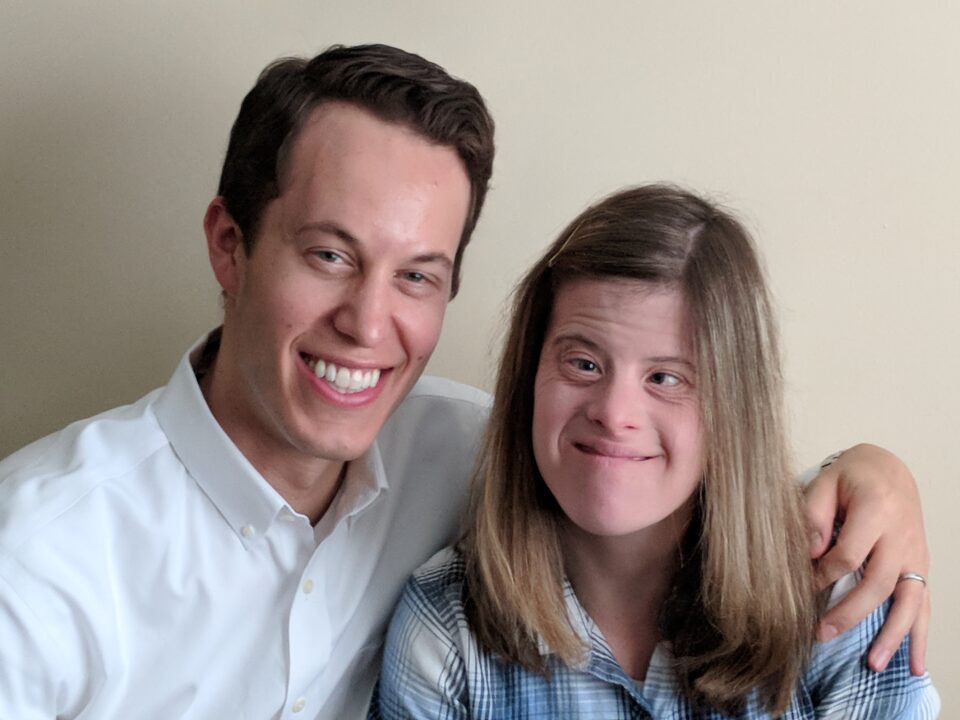Dr. Brian Skotko is a board-certified medical geneticist and the Director of the Down Syndrome Program at Massachusetts General Hospital in Boston. He has co-authored numerous books and articles on Down syndrome and other intellectual disabilities, and is a much sought-after speaker at conferences and events.
Dr. Skotko’s most recent professional focus has been developing an innovative means for families that have no access to a Down syndrome specialty clinic to access world-class medical information through a virtual clinic called the “Down Syndrome Clinic to You.”

Mark Bradford: Brian, it was great to see you again in July at the National Down Syndrome Congress in Orlando. There are so many things we could talk about, but space is limited. I would like to focus on what drew you to this work, your quality-of-life research, and your important new project, Down Syndrome Clinic to You or “DSC2U.”
So, let’s get started with the first question. I know, like many of us that get involved in this kind of work, you have a sister with Down syndrome. However, not everyone takes their commitment to the point of attending Harvard Medical School and then becomes a board-certified medical geneticist through Harvard’s Kennedy School and goes on to run a major program that serves individuals with Down syndrome in the Northeastern US that also attracts families from all over the world. What have been the greatest influences on your career, and how have your specific interests in Down syndrome care and research been formed?
I am reminded daily that our work is far from over in ensuring that all neurodiverse persons are valued.
Brian Skotko: I’m certainly grateful to my sister—and all my patients with Down syndrome—who have and continue to teach me important life lessons. They teach me to pause when I am tempted to rush, to feel when I want to rationalize, to cherish bronze when I am looking for gold. Yet the Down syndrome community pushes me beyond just happy life lessons; its families have gifted me a deep sense of purpose. Rather than focusing on my ego-centric dramas, I am reminded daily that our work is far from over in ensuring that all neurodiverse persons are valued. My clinical and research efforts are aligned toward this goal.
Mark Bradford: In reviewing your extensive list of publications, your research interests in Down syndrome partly include obstructive sleep apnea, autoimmunity and Down syndrome regressive disorder, Alzheimer’s disease, thyroid disease, trials of drugs to improve cognition, and a specific area of interest to me, family experiences of Down syndrome.
What impact does having a child with Down syndrome have on a family dynamic?
Brian Skotko: Our society is quick to draw its own conclusions about people with intellectual disabilities, so my colleagues and I sent out a survey to people with Down syndrome and their families in the US. Families are not looking for pity. Quite the contrary: nearly 99% of people with Down syndrome state that they are happy with their lives; 88% of their brothers and sisters believe that they are better people because of their sibling; and 79% of parents feel that their outlook on life is more positive because of their child. The Down syndrome of today is not the Down syndrome of yesteryear. That’s not because the genetics have changed; we have.
Mark Bradford: Back in Jérôme Lejeune’s earlier days, Down syndrome was diagnosed after a baby was born. Now, there are many prenatal screens and testing options available to couples. Can you review what resources are available for expectant couples who have received a prenatal diagnosis of Down syndrome?

Brian Skotko: Gold-standard resources to support expectant couples are available after years of collaborative work between medical organizations and disability advocacy groups. In my opinion, we have an outpaced implementation challenge. The science of prenatal testing has been on a bullet train in recent years, but these resources and support for expectant couples trail behind on a Conestoga wagon. Expectant couples have indicated that the information that they do receive from clinicians about genetic conditions is often incomplete, inaccurate, and dated. Negative memories of these diagnostic conversations are often more vivid, intense, and visceral than people’s recollection of tragedies like 9/11. So, how do we get the right information into the right hands at the right moments? Outreach programs from nonprofits need sustainable funding. Prenatal testing companies should adhere to reporting guidelines. Clinicians need training.
Mark Bradford: I know that you and your colleagues Gert de Graaf, Frank Buckley, and Ellen Skladzien have been doing lots of research on the changing demographics of people with Down syndrome. What have you been learning in countries around the world?
Brian Skotko: We estimate that in recent years, there were 36% fewer babies with Down syndrome than could have been born in the US because of selective terminations. Annually, in our country, this amounts to about 5,100 babies with Down syndrome being born, and 3,900 fetuses with Down syndrome being selectively aborted. The reduction of babies with Down syndrome has steadily risen in Europe over the past 40 years to over 50% today—as high as 83% in Spain, 80% in Portugal, and 71% in Italy. New Zealand and Australia closely follow, at 71% and 66%, respectively. We found that abortion coverage for a Down syndrome diagnosis was covered fully by government funding in 52.4% of these countries in 1990, and that number increased to 73.8% in 2021.
We are on a mission to democratize health care for people with Down syndrome around the globe.
Mark Bradford: We know how important specialized medical care is for individuals living with Down syndrome across the lifespan. I remember when you first began working on your Down Syndrome Clinic to You project. It was exciting to see it in action during your presentation in Orlando. Tell us about your motivation for engaging in this huge project, what it is, and how it works.
Brian Skotko: With prenatal testing becoming ever more available, many parents in the Down syndrome community worry that the medical establishment will pass them by. They feel a critical and urgent need for adequate health care for their loved ones with Down syndrome. More than 95% of people with Down syndrome in the US do not have access to a specialty clinic like the one that my team and I implemented at Massachusetts General Hospital. They are simply seen by primary care providers, but it is unreasonable and impractical to think that today’s providers can stay up-to-date on the medical guidelines for every genetic condition.
This is why we built Down Syndrome Clinic to You, an online platform that delivers automated, personalized checklists in English and Spanish for caregivers and local primary care providers. Parents can now enter in questions and concerns from the comfort of their own homes, and they will get instant suggestions and links to the best resources.
Simply put, we are on a mission to democratize health care for people with Down syndrome around the globe.
Mark Bradford: Brian, well said. Thanks so much for your commitment to improve the lives of those living with Down syndrome, and for all of your work to ensure that those who receive a prenatal diagnosis of Down syndrome have accurate information, and then the opportunity to access the best possible information to guide medical care through your innovative Down Syndrome Clinic to You. May God continue to bless your excellent work.
